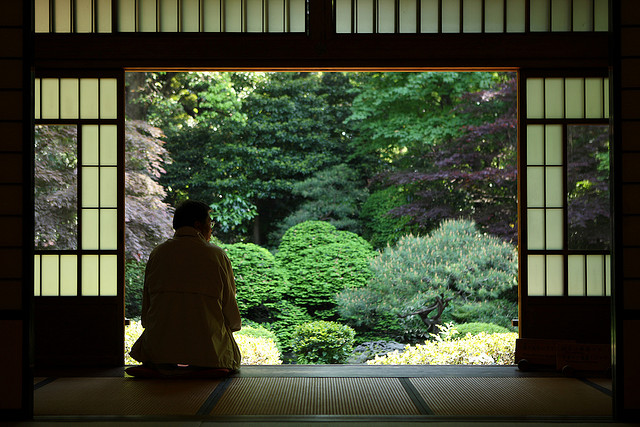
“Your body is precious. It is our vehicle for awakening. Treat it with care.” ~Buddha
Getting sick is rarely, if ever fun for anyone, but we all get sick. You can cheat on your taxes, but you can’t cheat on sickness.
When we get sick, we all have a choice of how to work with illness. We can choose to be miserable or we can choose to learn about ourselves and grow from the experience. Since I have had such a hard time with the latter, I’ve investigated 5 ways to practice with illness.
1. Reflect on the benefit of health.
Often illness brings into focus what we wish we could be doing when we feel healthy.
Once, back when I was a pack-a-day smoker, I got food poisoning, and I remember the smell or thought of cigarettes made me feel so much worse. At that time I vowed not to smoke anymore. I felt the frailty of my body and I didn’t want to live a life that hurt my body. I saw how much I needed my body, how bad it felt to not be able to rely on it.
Unfortunately as soon as I felt better I forgot what I knew when I was really sick. Being sick gives us the chance to reflect on the value of health and what you want to do with your life energy when you do feel better. People who are in hospitals only have time to sit around and watch TV; is that what you want to do with your free time?
We only have so many hours and days of health. How can we use each hour of our lives to benefit the people we love the most?
2. Take time to do little things.
Write letters, reorganize your closet, or read a book of poetry. We often take small simple tasks for granted. Their simplicity can seem too easy for us when we are in the midst of a busy life, but when we are sick they might be at just the right pace for us.
I tend to “veg” in front of the TV, but reading that book I’ve been meaning to finish or writing an email to my sister wouldn’t take much energy either.
Sickness makes us slow down, so it’s a great time to do the simple things. We can use this change of pace to change perspective.
3. Reflect on the frailty of life.
So let’s face it: We aren’t going to be here forever. There is no way to avoid old age, sickness, and death. Our willingness to acknowledge impermanence can either bring anxiety or help us focus on what we want to do with our lives.
Being sick is a great time to reflect on the meaning of our lives. Sickness can be a wake up call to remind us that we aren’t made of Teflon. Alas, all sorts of stuff sticks to us in life and it’s up to us what we want to work to let go of.
What principles do you want to adhere to in life and what small things could you let slide? If you only had a year to live, what would you do with the time you have left? If someone you care about got sick, what would you want to say to that person? Why are you waiting?
Sickness reminds us of the frailty and preciousness of this life. It brings into focus that we can never know when things will change for us. We can greet this truth with fear and annoyance, or we can greet it with gratitude for the wisdom it brings us.
4. Let others take care of you.
If you are like me, you are often in the role of caring for others. Many people get stuck in the role of the capable and strong person, especially the kinds of people that read blogs about mindfulness and self-improvement.
I have often said of myself, that I make a very bad patient. I can sometimes think that if I’m not the capable one, people won’t want to be around me. Somehow, if I need them instead of them needing me, that will be the end of our connection.
You may have had this thought process that arises for you when you are sick, or need to ask for help. Maybe when you were growing up asking for help was met with accusations of selfishness, or perhaps not met at all.
No matter what the situation, it’s important to remember that letting others help us is a wonderful gift to give.
Just reflect on how good it feels to help someone we care about. Being sick is a great time to practice asking for and receiving the help and care of others. This can be especially true if we express gratitude to those helping in a way that doesn’t involve a sense of guilt or discomfort with their offering.
Accepting help authentically and expressing gratitude whole-heartedly, helps us remember how both parities benefit from the exchange of kindness.
5. Reprioritize self-care.
When we are not receiving help from others, being sick is a great time to learn the value of taking care of ourselves. Sometimes when I am sick, I can trace back to the imbalance that may have led to the illness. We often push ourselves very hard either out of desire or obligation.
This pushing can work on occasion, but each time we get out of balance we risk falling into ill health: by becoming sick, overwhelmed, or injured. We get so busy that forget about the essential art of taking care of ourselves. Illness is one way we can be called back to value of this art.
Being sick is a great time to give ourselves permission for self-care. It’s a time to get in touch with what we find soothing. It’s a time for long baths and hot tea, for listening to the rain and curling up underneath a blanket, for eating soup and reading a good book.
All of the little pleasures that we have a hard time finding time for can be enjoyed (hopefully without guilt) when we are sick.
Of course you don’t have to wait to be sick to reflect and engage in any of these illness practices. These are all nourishing practices to engage in no matter what the state of your health.
Here are some suggestions for healthy folks:
Reflect on what you’d miss most about being healthy if you were sick.
How can you use you health to benefit yourself and others?
Take some time to do one little project that would bring more peace and order to your life.
How would your life change if you did one of these a week?
Reflect on your own death and what you want to do with the life you have left.
If you only had a year to live what would your priorities be?
Ask for and receive help from someone this week, then express real gratitude for their help.
What if you exchanged kindness with others, more freely, and more often?
Finally, take time to do one act of self-care this week.
What if you regularly scheduled time to do something to bring your life back into balance?
Whether in sickness or in health, life calls for us to pay attention. Every practice that helps us pay attention lengthens the life we have left.
Photo by Mr Hayata
About Samuel McCree
Samuel "Gentoku" McCree is a Mindful Fitness thought leader, personal trainer, and mindful living coach from Portland, OR. He trained for two years at a Zen monastery, is an endurance athlete, and founder of MindFitMove. You can find his blog and a free Ebook on Your Sexy Brain at mindfitmove.com.













 Though I run this site, it is not mine. It's ours. It's not about me. It's about us. Your stories and your wisdom are just as meaningful as mine.
Though I run this site, it is not mine. It's ours. It's not about me. It's about us. Your stories and your wisdom are just as meaningful as mine.
What a coincidence, yesterday I felt sick, so today I was at home trying to recover. Great article, thanks a lot for it!
Glad it was helpful I hope you feel better!
Very helpful I loved it I almost feel like I’m not sick